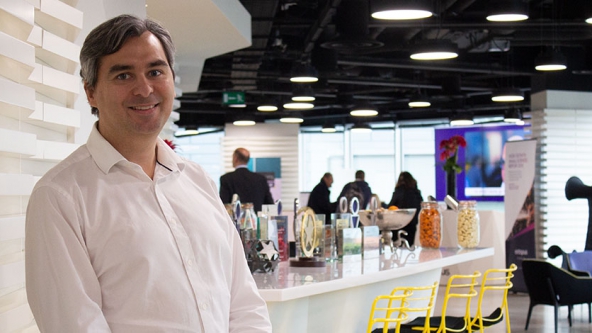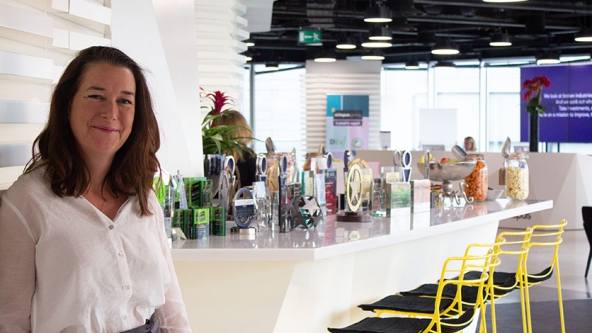Have you ever found yourself wondering why you’re better at some parts of your job than others, or why certain situations frustrate you when they barely cause your colleagues to break a sweat? The answer lies in our motivations.
Understanding your motivations can help you develop your career, get on better with your colleagues and keep your emotions in check. At Octopus, we use a tool called the Strength Deployment Inventory® (SDI) to discover what drives us.
What is SDI®?
You can read a full explanation of SDI® in our earlier article. To take part in SDI®, everyone at Octopus answers questions which uncover whether we’re motivated by wanting to help people, wanting to achieve results, or wanting to establish order. Each of these motivations is assigned a colour; people is blue, results is red and order is green. If a person is motivated by the need for flexibility and a concern for the welfare of the group, they are a hub. People can also be a mix of two colours (again, you can find out more about this in the article linked above).
SDI® is by no means rigid, so just because a person is blue, for example, it doesn’t mean they can’t enjoy establishing order too. But on the whole, SDI® is a really useful explainer for our overall drivers.
Below, people from around the Octopus business share their stories about what SDI® means to them, how their motivations affect them and tips for making the most of their unique drivers. Read on to discover how your motivations can become your greatest strengths.
Blue – Philippa Russ (Change Director, Octopus Investments)
For me, the value of SDI® comes from understanding what drives me. My colour has got me perfectly. I’m blue, which means I’m motivated by people. For example, the best bits about my job are my team, getting them to learn, developing them, and so on. And when I think about jobs I haven’t liked as much, they haven’t been as fulfilling in terms of allowing me to develop others.
I’d advise any other blues to celebrate your motivations and don’t confuse them with behaviours. Just because we like helping people doesn’t mean we don’t like getting tasks completed; our ‘blueness’ just tells us about why we want to get those tasks completed. I’d also recommend you get comfortable with working out where your energy is best placed – sometimes you might be the best person to help, and occasionally you might be better off not getting involved. On some occasions, the most helpful thing to do is actually to not help someone, which seems counter-intuitive initially.
Green – Gavin Eustace (Head of Residential Development, Octopus Real Estate)
Knowing your SDI® colour, and knowing other people’s, can help you evolve and see what your strengths and weaknesses are. Additionally, it helps when it comes to communicating; everyone is different and being aware of someone else’s motivations can give you an idea of how they will express themselves. It can be useful outside of work too, helping you learn more about what makes you happy so you can look after your mental health.
I’m a green, which means I’m driven by analysis and a desire for process. This came as no surprise to me – I’m very aware that I tend to fixate on the details! For other greens, I’d recommend trying to step away from the tiny detail a little more to see the big picture. It’s something I’m trying to improve myself. Seeing the big picture lets you see it doesn’t matter if you’re off by a few minute points. Sometimes, done is better than perfect.
Red – Ruth Handcock (CEO, Octopus Investments)
People’s brains work completely differently from your own, and I learn that every day. The power of SDI® is that it gives me a common language to use to talk to other people about it. Most critically, it’s a really useful tool to help me understand how my team like to be motivated and rewarded so I can get the best out of them.
I’m a red, which means I’m motivated by achieving results. From a young age I’ve been occupied by not wanting to waste opportunities. I’ve always hated the thought of looking back and thinking “I didn’t try very hard,” or “that could’ve been really good if I’d have given it my best.” And if I do that and it doesn’t work out, I’m fine with it, as long as I know I’ve done my best. It just feels like such a waste of a life not to try.
To other reds, I’d say don’t be afraid to be the driver in a team. But at the same time, be aware that delivery and achievement of tasks is about everyone in the team playing their part, and other people won’t be motivated to work in the same hard, fast-paced way as you. Others may need to understand why you think it’s the right course of action, or what data supports it. And if you find yourself in a leadership position, think about how you create your team. Consider the differing personalities and make sure you’ve got a good balance of motivations; no team will be successful if all you’ve got is people delivering, delivering, delivering.
Hub – Benjamin Davis (CEO, Octopus Real Estate)
SDI® is a really important tool. It’s good to understand where someone sits when you need to engage with them, so you appreciate where they are coming from and why they are behaving in certain ways. That way, you can predict how conversations are going to go and plan strategies to get the best out of interactions.
I’m a hub. What that means is that I’m motivated by a desire for flexibility, and can flex between red, green and blue in any given situation. I really enjoy this, and get a real kick out of variety.
I’d advise other hubs to not be afraid to lean into your ability to change your mind. It’s not a weakness to have firm views loosely held. You can have a really strong opinion but once someone else has given you more information, I see it as a strength to be able to say, “you know what, I’ve learned more about this and you’ve changed my view on it.” Also, I would say to remember it’s a two-way street when working with people who have different motivations to you. Adjust how you approach things to get the best out of the person, but bear in mind they have to make the effort to find a way to work together well, too.


